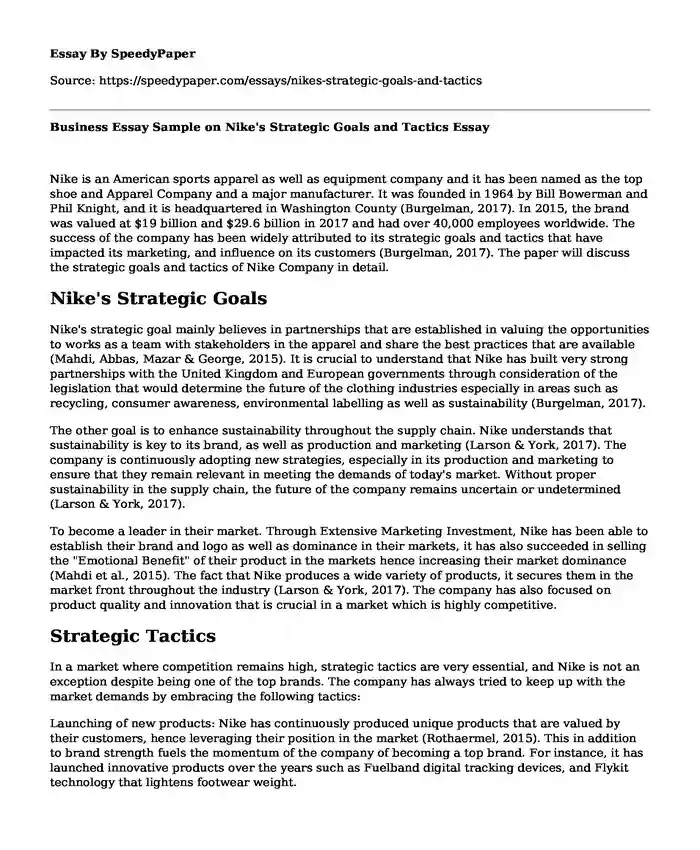
| Type of paper: | Business plan |
| Categories: | Nike Business strategy |
| Pages: | 3 |
| Wordcount: | 765 words |
Nike is an American sports apparel as well as equipment company and it has been named as the top shoe and Apparel Company and a major manufacturer. It was founded in 1964 by Bill Bowerman and Phil Knight, and it is headquartered in Washington County (Burgelman, 2017). In 2015, the brand was valued at $19 billion and $29.6 billion in 2017 and had over 40,000 employees worldwide. The success of the company has been widely attributed to its strategic goals and tactics that have impacted its marketing, and influence on its customers (Burgelman, 2017). The paper will discuss the strategic goals and tactics of Nike Company in detail.
Nike's Strategic Goals
Nike's strategic goal mainly believes in partnerships that are established in valuing the opportunities to works as a team with stakeholders in the apparel and share the best practices that are available (Mahdi, Abbas, Mazar & George, 2015). It is crucial to understand that Nike has built very strong partnerships with the United Kingdom and European governments through consideration of the legislation that would determine the future of the clothing industries especially in areas such as recycling, consumer awareness, environmental labelling as well as sustainability (Burgelman, 2017).
The other goal is to enhance sustainability throughout the supply chain. Nike understands that sustainability is key to its brand, as well as production and marketing (Larson & York, 2017). The company is continuously adopting new strategies, especially in its production and marketing to ensure that they remain relevant in meeting the demands of today's market. Without proper sustainability in the supply chain, the future of the company remains uncertain or undetermined (Larson & York, 2017).
To become a leader in their market. Through Extensive Marketing Investment, Nike has been able to establish their brand and logo as well as dominance in their markets, it has also succeeded in selling the "Emotional Benefit" of their product in the markets hence increasing their market dominance (Mahdi et al., 2015). The fact that Nike produces a wide variety of products, it secures them in the market front throughout the industry (Larson & York, 2017). The company has also focused on product quality and innovation that is crucial in a market which is highly competitive.
Strategic Tactics
In a market where competition remains high, strategic tactics are very essential, and Nike is not an exception despite being one of the top brands. The company has always tried to keep up with the market demands by embracing the following tactics:
Launching of new products: Nike has continuously produced unique products that are valued by their customers, hence leveraging their position in the market (Rothaermel, 2015). This in addition to brand strength fuels the momentum of the company of becoming a top brand. For instance, it has launched innovative products over the years such as Fuelband digital tracking devices, and Flykit technology that lightens footwear weight.
Diversification: the company continues to diversify its products, by launching other lines of consumer products to include every individual in the market (Rothaermel, 2015). For instance, it launched Dri-FIT which is a foundation that adapts apparels from shirts to socks. One of its key performance has been the Dri-FIT Knot for running and the Nike Pro Bra Collection.
Investment in new technologies: the company has embraced and has made technology a part of their day to day operations (Rothaermel, 2015). The company has increased automation and thus helping to reduce wastes, as well as an increase in customization of its products and speed to the market. Automation has also been a driving force in the growth of a high gross margin in customer business.
Brand ambassadors: Nike spends over $2 billion in marketing alone, and their strategy has included promotions through sports ambassadors and other world icons who are admired by many (Mahdi et al., 2015). Michael Jordan, the NBA player, even had a shoe named after him. Other notable individuals include Tiger Woods who plays golf, Cristiano Ronaldo and Ronaldinho, Serena Williams among others. This strategy has seen the popularity of the company grow and so has its sales and position in the market.
Reference
Burgelman, R. A. (2017). 9. Complex strategic integration at Nike: Strategy process and strategy-as-practice. Handbook of Middle Management Strategy Process Research, 197.
Larson, A., & York, J. (2017). Nike: Moving Down the Sustainability Track Through Chemical Substitution and Waste Reduction. Darden Business Publishing Cases, 1-4.
Mahdi, H. A. A., Abbas, M., Mazar, T. I., & George, S. (2015). A Comparative Analysis of Strategies and Business Models of Nike, Inc. and Adidas Group with special reference to Competitive Advantage in the context of a Dynamic and Competitive Environment. International Journal of Business Management and Economic Research, 6(3), 167-177.
Rothaermel, F. T. (2015). Strategic management. McGraw-Hill Education.
Cite this page
Business Essay Sample on Nike's Strategic Goals and Tactics. (2022, Sep 01). Retrieved from https://speedypaper.com/essays/nikes-strategic-goals-and-tactics
Request Removal
If you are the original author of this essay and no longer wish to have it published on the SpeedyPaper website, please click below to request its removal:
- Free Essay on Organizational Citizenship
- Essay Example on Women's Reproductive Rights in America
- Can We Cure Diabetes? Get the Answer in Our Essay Sample
- Ethical Issues in Malaria Research, Essay Example for Everyone
- 2). Federal Activity Reflection Essay
- Free Essay. Why Supreme Court Justices Should Not Be on the Bench Forever Until Death
- Paper Sample: Problems Confronted By the Freight Project
Popular categories




